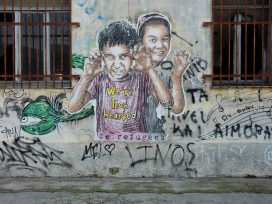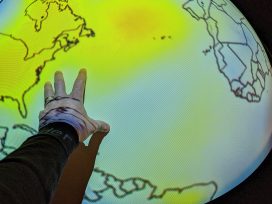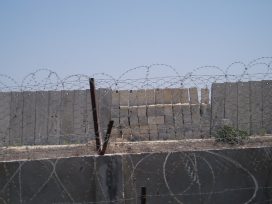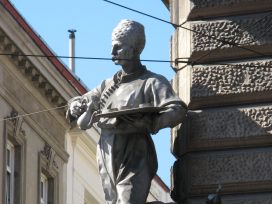Rather like climate change, a quietly brewing concoction of xenophobia, intolerance and fear of difference is threatening the future of Europe. Aggressive political demagoguery drumming up hatred against minorities, immigrants and democracy itself is on the march again. Leading the charge are not only fundamentalist and xenophobic movements, but also, most worryingly, mainstream political forces trying to appease national majorities, looking for a quick fix to address public insecurities related to economic uncertainty, future stability and Europe’s place in the world. And, alarmingly, they are proving to be successful. Many people in many European countries are coming to see the stranger and those deemed to be different as a contaminant or threat, much in the same way as Europe did in colonial times and during its dark totalitarian decades prior to 1945.
Fear, suspicion and hatred are becoming everyday public sentiments, legitimating vilification and harsh forms of discipline as normal, breeding on endless talk of greedy asylum seekers, disloyal and seditious immigrants, would-be Muslim terrorists, and an illusory desire to return to founding principles and chauvinistic values. A new lexicon of “us versus them” is being rolled out, blaming the victims of unfettered financial speculation, poverty, inequality, and authoritarianism at a global scale, and pretending to ignore how the contribution of immigrants and refugees has been, is and will remain essential to European social, economic and cultural life. A new mentality of “catastrophe management” is being promoted, centred on the containment or elimination of the stranger and non-conformist through extensive surveillance, border controls, curtailment of rights, naming and shaming.
This is a dangerous turn, and as in the darkest moments of its history, Europe runs the risk of waking up too late. We are close to the point of no return from a Europe excessively obsessed with diversity and wrongly blaming difference for its problems. These are complex problems, linked to a variety of causes such as deep economic crisis and instability, the impacts of market society on individual and collective responsibility, the absence of a model of belonging appropriate for a plural and open society, the breakdown of comprehensive risk mitigation and social insurance systems, the intensification of a politics of surveillance, normalisation and punishment after 9/11, and nostalgia for a mythical Europe of cosy, homogeneous communities. These problems need to be acknowledged and alternative solutions need to be found; solutions that can harness diversity and difference as a way of facing the future. Otherwise Europe will find itself once again in an age of suspicion and intolerance, with even friends and neighbours becoming enemies as a politics of suspicion and anxiety tightens its grip.
The aim of this “open letter”, which is addressed to publics, opinion-makers and political actors in Europe who value the open and democratic society, is to formulate another way of approaching diversity and difference in Europe. There is considerable latent anxiety over the dark twists and turns we are witnessing in many European countries, but it has yet to stack up into an irreversible clamour for change. This letter might help in raising the tempo. But it is also important that the anxieties and fears on which intolerance and xenophobia feed are not dismissed as irrational, and those who hold them as abnormal, as we frequently find in current anti-racist and anti-fascist protest. The stance of this letter is to acknowledge the unsettlements associated with the profound changes Europe is witnessing, but to seek to dislocate them from their current associations with difference and “strangers”, and to address them, instead, through a politics of solidarity, reciprocal learning and cooperation among all those who find themselves in Europe.
Such dispositions cannot develop in a vacuum. Accordingly this letter traces the outlines of another model of belonging and participation in Europe, one that argues for hope and courage in the face of uncertainty and risk, solidarity and learning as a resource for the future, diversity and cultural pluralism as the status quo, economic fairness, a shared commons at the centre of public policy, and democratic engagement and debate as the staple of political deliberation. In this sense, the letter is a call to European progressive political leaders and representatives to transcend the shortsighted views and interests that so far have dominated the response both to the economic crisis and to the growing wave of xenophobia and general intolerance vis-à-vis social and cultural diversity.
We call on them to exercise their responsibility to promote and implement legislation and concrete policies consistent with universal human rights, both in Europe itself as well as in the relations and exchanges between Europe and the rest of the world, especially the impoverished societies. That is, legislation and policies geared on the one hand to build on the best European traditions of hospitality, openness to difference, innovation and change, dialogue and democratic engagement, and on the other, in opposition to the colonial and imperial practices still in place. We urge them to establish a new set of rules, based on cooperation and reciprocity, in Europe’s relations with all those countries where life – human and other – most often is the cheapest commodity.
A critical moment for Europe
The enormity of the change sweeping through Europe needs to be recognised with clarity. A hard-won legacy of openness, inclusion and engagement towards the unfamiliar and unexpected is being threatened by a “catastrophe” approach based on exclusion and the vilification of anything that apparently endangers the customary way of life. Both approaches to change are present in Europe, one looking to the future with courage, curiosity and a desire to evolve, and the other with fear, dread and an anxiety to preserve a privileged but unsustainable way of life.
The inclusive approach is rooted in the principle of provision for an expanding spectrum of social actors at home and abroad, typically through collective negotiation, social insurance, empowerment and education, social cohesion and inclusion, dialogue and democratic engagement. It brings the outside and the foreign into the inside. Europe’s long humanist legacy, aspects of the post-war European social model, and late-twentieth century recognition of gender, racial, sexual and post-colonial equality by the EU and many member states, can be seen as heirs of this tradition.
The catastrophe approach is rooted in the principle of mitigation against hazard and risk through elaborate military-like preparations including disaster planning, warnings of Armageddon, predatory surveillance, restriction of civil liberties, and the violent oppression of dissent, difference and the foreign. The outside must be kept at bay, the enemy must be named, the primitive must be tamed, and tough measures must be taken in the name of social and cultural preservation, collective security and wellbeing.
This is how Europe justified the exploits of Empire and colony, its differences with the Orient and Islam, its division of the world into superior and inferior races and peoples conveniently colour coded, the brutal suppression of Jews and Roma, and the brutal suppression of dissidents, non-conformists, workers and peasants by different totalitarian regimes. This is how contemporary “emergency” measures after 9/11, bent on targeting would-be terrorists, unfit citizens and social outcasts through loose proxies such as physical appearance, religious belief, cultural practices, race and ethnicity, social and economic status, can be linked to a dark European legacy based on the demonization of particular types of vulnerable bodies. And this is how the politics of fear is used to curtail not only civic and political rights for the whole society, but also to dismantle the hard-won conquests of the oppressed and exploited in terms of labour conditions and welfare services.
It is not long before this politics of fear and hate, having exhausted the list of easily identifiable scapegoats, will create new divisions in order to sustain itself. It is not long before a biopolitics of fear and resentment that tries to shut out an irreducibly plural and porous world will incapacitate Europe, as the means to engage, to look ahead, to cultivate an ethic of care, empathy and curiosity are lost.
Facing the future together
Europe is home today to millions of people from non-European backgrounds, many religious and cultural dispositions, networks of affiliation that stretch right across the globe. It is as much a site of longings rooted in myths of origin and tradition – regional, national and continental – as it is a site of cosmopolitan identities and attachments, a place of plural and hybrid composition, drawing on varied geographies of cultural formation. In such a Europe it makes no sense to close the borders, to play the game of good insiders and bad outsiders, to defend ethnic and cultural purity, to demonise everything alien, to declare the end of secularism. It also makes no sense to valorise an image of European history that is centred upon cultural homogeneity and nationalised “purity”. Engagements with difference have marked Europe from its earliest days and such engagements are equally unavoidable in the European present and in any image of its shared future.
There is no denying that these are turbulent times, riddled with large and often unforeseen risks and hazards thrown up by the entanglements of an unregulated and interdependent world. Those risks, however, have much more to do with the uncontrolled movements of speculative financial capital and global economic integration than with the over-controlled displacements of migrants and refugees trying to reach a destination to work and live with dignity, the vast majority of whom are moving within their countries of origin and within the south of the planet. Governance has become an art of trial and error, making the best of an imperfect and fully unknowable world. Risks quickly multiply, mutate, cross borders, and this no doubt worries governments and publics seeking certitude and a secure future. But uncertainty, escalation and imprecision – all requiring the need to act in new ways – should neither be read as unavoidable catastrophes, nor, most importantly, as problems that can be resolved through a politics of retrenchment, generalised fear and militarisation; a politics of harming some bodies for the safety of others. They also represent new opportunities, new prospects on a future in the making.
Europe has to find a way of tackling hazard, risk and uncertainty by harnessing rather than rejecting diversity and difference; by inventing new solidarities rather than craving for an uncontaminated future; by cultivating an ethos of hope, shared ground and common purpose rather than one of hate and division; by accepting that acting in an uncertain world requires the wit, imagination and effort of all stakeholders rather than the designs and impositions of so-called experts and tough leaders; by realising that the negotiation of complexity and interdependence – the world as it has become – requires an attitude of pragmatic experimentalism, continuous learning and negotiation, rather than a stance of heroic certitude and unbending projection.
A start on this difficult but necessary journey to rethink how best to live in a plural and uncertain world is to jettison a culture of emergency management through obsessive surveillance and control. What is needed, instead, is to clarify why democracy, inclusion, empowerment, fairness and social justice for the many and not only the few – in Europe and beyond – is a precondition for dealing positively with uncertainty and change. New work is required to show with conviction and evidence that gender, class, racial and sexual equality are a good thing; that access for all to the means of well-being in a society releases new capabilities and reduces envy and resentment; that full-blown democracy involving universal rights, representation, popular participation and public scrutiny spreads responsibility and checks power abuses; that investing in the collective infrastructure shared by all and in future sustainability reduces fear and anxiety along with underpinning a sense of the shared turf; that widespread economic opportunity, parity and security can reduce conflict and disaffection.
These cannot remain empty phrases, but must form part of a new and passionately felt politics of social inclusion and justice that is not just whispered from the sidelines, but can demonstrate that there are significant gains to be made by majorities and minorities, citizens and residents, and above all, society as a whole. This is not an argument for a simple return to the welfare state. Times have changed, and past effort was not without its problems. Only too frequently, states and elites rolled out giant programmes in the name of equality that fell far short, while majorities continued to discriminate against minorities, outsiders, and the vulnerable under the guise of universalism and collectivism.
Towards a politics of the commons
The challenge of bridging similarity and difference, the particular and the common, the familiar and the strange, thus remains an unresolved challenge, as does the need to show how such bridging is the road to peace, progress and understanding in a turbulent world. These are difficult issues that need to be addressed through collective debate over the concerns at stake, through public ownership of and conviction in the justice of the proposals put forward. Otherwise the proposals – no matter how sophisticated or persuasive – will be rejected as impositions.
A start can be made, however, by indicating the kind of ethos that is needed to face the future through diversity and difference. First, it must be an ethos of hope not fear, trust not suspicion, reciprocity not domination, dialogue not condemnation, and negotiation not aggression. Secondly, it must be an ethos of finding vision in the dark through many eyes and torches held by many hands, united by belief in the benefits that come from unity and solidarity, but also by the knowledge that the way can never be fully illuminated, is full of potholes and dangers to be negotiated through common concerns. Thirdly, therefore, it must be an ethos of pragmatic learning, trial and error, but clear about the principles of the open society and the Charter of Human Rights that cannot be violated. This includes pressing for the complete dismantlement of the catastrophe mentality and its infrastructure. These three dimensions of an ethos of shared concern, mutual engagement and pragmatic learning should be the basis on which a sense of “the European” should emerge.
The problems of race, ethnicity and culture that have come so much to centre stage in the politics of catastrophe management need to be put back in place by making space for a wider frame of collective reference and shared ambition, itself understood to require the effort of all members of a society. An ethic of care for the commons has to lie at the centre of an inclusive and non-fearful politics of preparedness for the future, harnessing difference and pluralism for common benefit, proposing shared injuries, concerns and injustices as political demands, rather than divisive accusations.
Pragmatically, this means pressing for particular keywords such as hospitality, fairness, solidarity and mutuality as the prime colours of the open society; debated in the public arena, used as the measure of things by people and institutions. It also means publicising something that Europe has excelled in historically, which is the tradition of nurturing public space and public infrastructures open to and shared by all. The achievements of public libraries, squares and parks, public education, health and transport services and facilities cannot be underestimated, especially when these spaces are used and appreciated by all. They are the formative ground of citizenship and respect for shared resources.
It also means advocacy for a vibrant public sphere, a variety of modes of collective communication, an instinct of taking things of social interest into the public arena. So, instead of burying latent concerns or introducing new policies by stealth, challenges, threats and risks are named, debated and subjected to democratic scrutiny. It means seeking unity in difference through a politics of shared interests, common problems made visible (such as housing and well-being, employment, security, urban services, the quality of the environment, future sustainability, and so on), so that the problems that face us all can become the basis for collective understanding and solidarity.
Finally, it means organising to protect the commons. Much is said today about the need to protect the environment against pollution and consumption. Our children may have little air to breathe in times to come if we continue to disregard nature. But there is more of the commons to protect, raising once again old questions of ownership and stewardship that will not go away. Banking reforms, redistributive justice, corporate social responsibility, public ownership and control, the democratic accountability of public communications, work for all, fair wages, universal insurance, building human capabilities and skills, regulatory reform, the social economy, and other aspects of the economy organised for meeting needs and spreading rewards, are all part and parcel of a much needed new politics of diversity. It is through such reforms that future growth can be directed to the many and not only the few, and for outcomes that address envy and enmity. Europe’s political classes seem to have forgotten this link, made so clear after the war in the effort made by states and progressive movements to repair the economy and the commons as the way forward for both prosperity and solidarity. This letter is a call to intervene, to revive an old tradition in Europe to question, to dissent. It proposes that living with difference in Europe should be seen as an opportunity to face the future together, in mutual respect.
The Forum of Concerned Citizens of Europe (www.forum-europa.org) is promoted by Ash Amin (Durham), Albena Azmanova (Brussels), Les Back (London), Laura Balbo (Milan), Iain Chambers (Naples), Nefise Özkal Lorentzen (Oslo), Bashkim Shehu (Barcelona), Pep Subirós (Barcelona), Teun A. van Dijk (Barcelona), Ruth Wodak (Lancaster).
Signatories include Michel Agier, Etienne Balibar, Peter Claussen, Costas Douzinas, Paolo Flores d’Arcais, Jerzy Hausner, Ivan Krastev, Evelin Lindner, Lord Bhikhu Parekh, Juan de Dios Ramírez-Heredia, Josep Ramoneda, Ziauddin Sardar, Saskia Sassen, Richard Sennett, Tzvetan Todorov, Françoise Vergés, and Tana de Zulueta.






